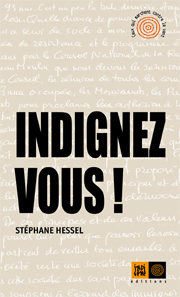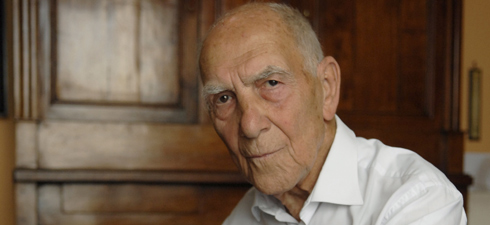 Just before closing time, a couple in their sixties rush into the bookshop: “Do you have Stéphane Hessel’s book?" "There's a pile of them over there,” the assistant answers. The pair, who look like retired schoolteachers, heave a big sigh of relief: they didn’t want to go home empty-handed.
Just before closing time, a couple in their sixties rush into the bookshop: “Do you have Stéphane Hessel’s book?" "There's a pile of them over there,” the assistant answers. The pair, who look like retired schoolteachers, heave a big sigh of relief: they didn’t want to go home empty-handed.
Another bookseller tells us that some customers have started buying the pamphlet in bulk: in particular one old lady who announced “I’ll take ten, so I can give them to all my friends,” and later asked if the proceeds from sales were donated to a particular association. In just two months, Indignez-vous ! by Stéphane Hessel has become a runaway success. With 500,000 copies sold, it has been reprinted ten times, and requests for translation rights have flooded in from all over the world: from countries as diverse as Turkey, Brazil, Poland and Japan.
A society exhausted by tales of international finance
The success of the twenty-page pamphlet, which has a cover price of 3 euros, has been fuelled not by a magic editorial formula, but by the fact that it captures the spirit of the times. And like a song that everyone is humming or a film that is all the rage, the popularity of Indignez-vous ! has been spread by word of mouth.
Buying the pamphlet is a political act, a gesture of communion, and participation in collective emotion. It has filled a need for a society exhausted by tales of brinkmanship in international finance and the disastrous social consequences of economic crisis, which was searching for words to express how it feels. When Hessel writes: “The ongoing international dictatorship of financial markets […] is a threat to peace and democracy,” he is expressing a widely held view, which is rendered all the more credible by his remarkable personal history.
Ever since the collapse of the alter-globalization movement, a large section of the public has been seeking the means to affirm that it does not want to live in a world where affluence and poverty are two sides of the same coin — and now they have found it. However, notwithstanding his broad-spectrum left-wing readership, Hessel’s pamphlet is clearly inspired by a traditional brand of social democracy.
Should indignation be a value in itself?
The text of Indignez-vous ! is surprisingly moderate. Even the much remarked-on comparison with the French Resistance is carefully qualified: “Today the reasons for indignation may appear less clear-cut in an overly complex world. Who is in command? Who decides? Distinguishing between the different currents that influence our government is not always easy. We are no longer dealing with a small elite whose actions we can readily understand. We can clearly see that ours is a vast and interdependent world.” In citing the authority of the economic programme of the National Council of the Resistance, he acknowledges that he is not offering an innovative solution to the current crisis: “The proposals that figure in this text and the challenges that it identifies are not original in themselves.”
The title, Indignez-vous ! remains an effective albeit ambiguous slogan. For Hessel, indignation is the force that generates committment, however, as a consequence he largely ignores the other motives that could lead to political action: emergent awareness, rational decision, the desire to serve, a yearning for truth and justice etc.
And with his appeal to indignation, Hessel inadvertantly privileges an emotion fueled by spectacle — a position criticised by the philosopher Hannah Arendt, who highlighted how a “politics of pity” based on an emotional response to the misery of others can undermine a more rational “politics of justice.”
Is a “politics of indignation” exposed to the same risks as a “politics of pity”? And should indignation be a value in itself? There was a time when the artistic avant-garde and anti-establishment protesters set out to shock the bourgeoisie: indignation was then a right-wing reflex. Perhaps the current vogue for the writing of an “indignant old gentleman” should be tempred by some consideration of the indignant protagonist in Brecht’s The Shameless Old Lady.
Biography
A 20th century life
In the twilight years of a remarkable life marked by history of the 20th century, Stéphane Hessel has published Indignez-vous! Born in 1917 in Berlin to a Jewish famly (which had partially converted to Lutheranism), he arrived in France in 1925, became a French citizen in 1937, and entered the Ecole Normale Supérieure in 1939. Mobilised in WWII, he was captured and subsequently escaped to join Général De Gaulle in London. Sent to France in 1944, he was arrested and deported to Buchenwald, where he disguised his identity to avoid execution. He escaped a second time only to be recaptured, and finally jumped from a train to rejoin the American lines in 1945.
After the Liberation, he was appointed secretary to the UN Commission on Human Rights and was associated with the drafting of the Universal Declaration of Human Rights. Granted the honorary title of Ambassador of France by the left in 1981, he devoted his retirement to activism on behalf of undocumented migrants (and acted as a mediator during the occupation of the Eglise Saint-Bernard in Paris) and, more recently, on behalf of Palestinians, notably through his involvement with the campaign to boycott Israeli goods.
Awarded the Légion d’honneur in 2006, Stéphane Hessel has the look and manners of a distinguished old gentleman. Affable, charming, and extremely polite, he likes nothing more than getting up after a good meal to recite works by Baudelaire and Verlaine. He is also no stranger to the joys of politics: in the 2009 European elections he was part of the list presented by Europe Ecologie. He is also a member of the French Socialist party (PS), and has pledged full support for his long-standing friend Martine Aubry in the 2012 presidential elections.
Was this article useful? If so we are delighted!
It is freely available because we believe that the right to free and independent information is essential for democracy. But this right is not guaranteed forever, and independence comes at a cost. We need your support in order to continue publishing independent, multilingual news for all Europeans.
Discover our subscription offers and their exclusive benefits and become a member of our community now!












